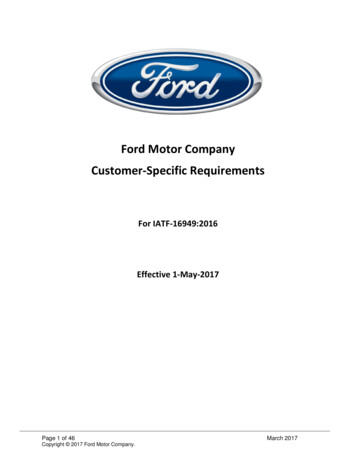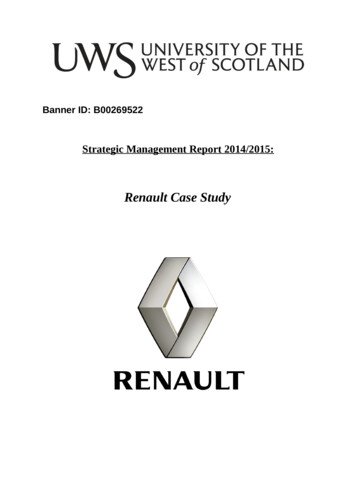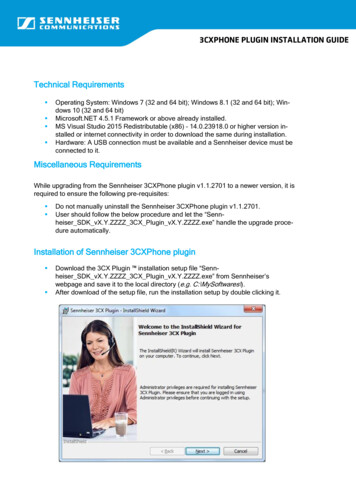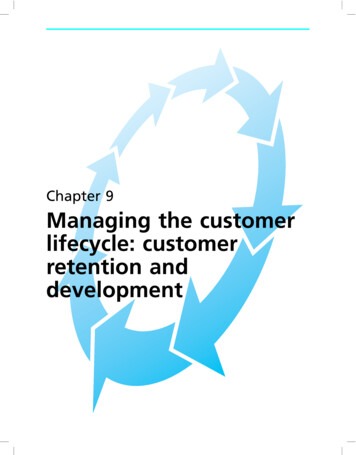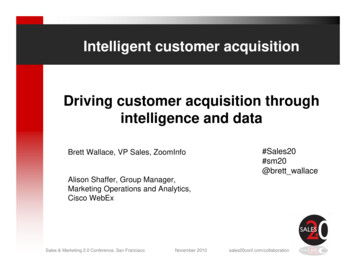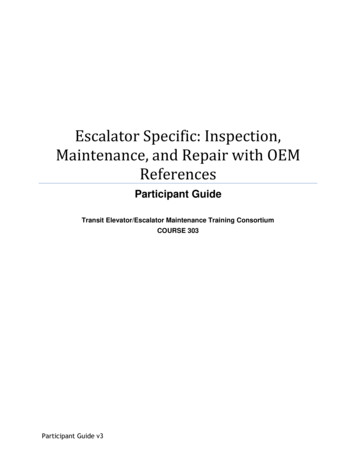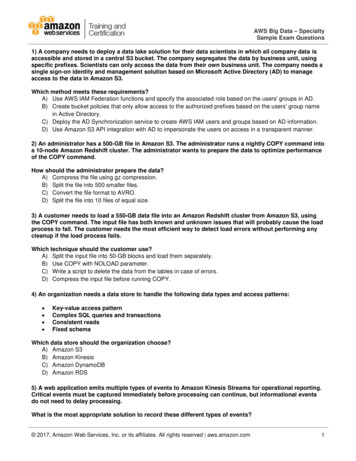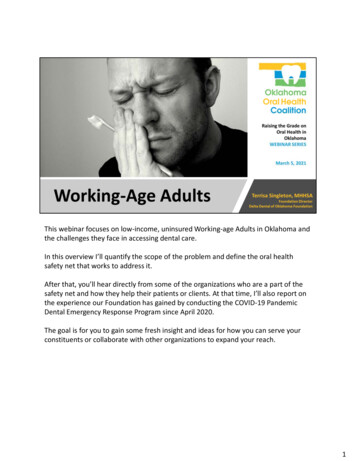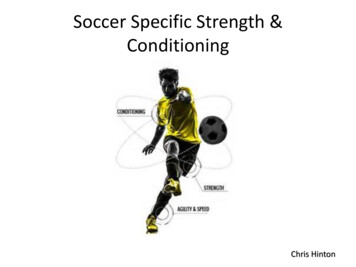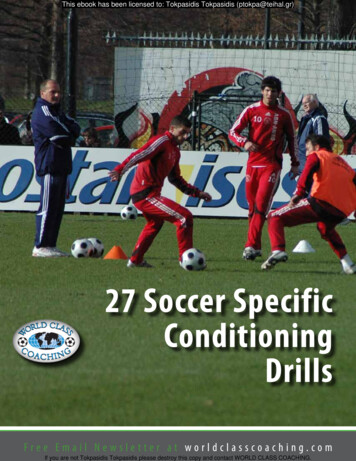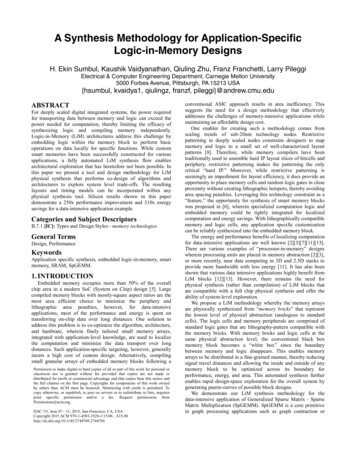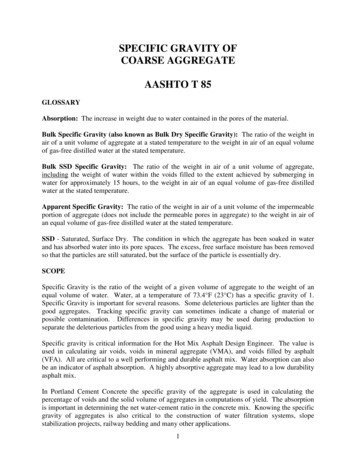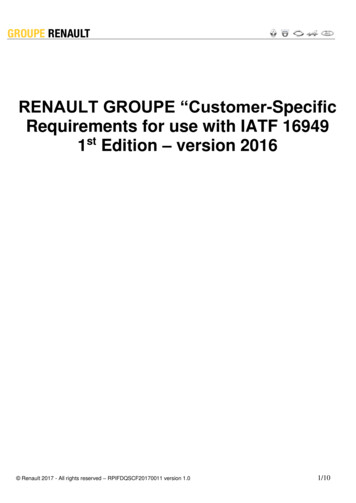
Transcription
RENAULT GROUPE “Customer-SpecificRequirements for use with IATF 169491st Edition – version 2016 Renault 2017 - All rights reserved – RPIFDQSCF20170011 version 1.01/10
Content1. Scope . 32. References . 33. Definitions. 34. Requirements . 4a) The supplier is expected to provide products that meet or exceed Renault Group Quality & CustomerSatisfaction, Cost and Delivery targets. . 44.1 Leadership and commitment . 44.2 Customer focus . 44.3 Resources . 44.4 Skills and Training . 44.5 Changes to requirements for products and services . 44.6 Control of nonconforming output . 54.7 Review of the requirements for products and services . 54.8 Product audit . 54.9 Nonconformity and corrective action . 5b) The certification body quality follow up . 55. Additional Information regarding Renault position vs IATF 16949 version 2016 . 8Focus on key items. 8Renault and the core tools . 9Notification to certification bodies . 10 Renault 2017 - All rights reserved – RPIFDQSCF20170011 version 1.02/10
Customer-Specific RequirementsFor Use With IATF 16949 1st Edition – version 2016July 2017 Renault Group 2017 - All rights reserved – 3rd revision of Renault CSR. (main changes in blue)Foreword: Part quality development is based on ANPQP which is formally conforming to expectations as mentioned inIATF 16 949 standard.1. Scopea) IATF 16949 and this document define the fundamental quality system requirements for organizations supplyingproductionand/or service parts to Renault. In addition to previous document, supplementary requirements mentioned in thisdocument include the following:As a key-reminder : The supplier shall inform and get feedback from Renault (RNPO and Plant SQA) about anyChange in its Product or Process or Controls means prior to start change implementation. Tier-1 supplier shallapply this requirement to Tier-2.- The supplier shall review FMEA by using Reverse FMEA (R-FMEA) tool and make this tool deployed over its Tier-2.- Supplier shall demonstrate exhaustively and at any request that its entire production is conforming to Safetyand Regulatory Characteristics in vigor for commercialization countries.- As systematic preventive action, the supplier shall not employ temporary workers on workstations producingSafety and/or Regulatory characteristics and on Final Control stations.- At last, Renault Group requests Supplier to deliver ZERO NC parts in its plants. Supplier shall define andimplement continuous scheduled action plans- heading to Zero NC- in order to meet this objective and to makeit reliable over the time.2. ReferencesInformation regarding the technical documents that are to be used when working with Renault Group will be listed inthe RFQ and/or will be available through the supplier portal.3. DefinitionsWhere inconsistent terminology exists between IATF 16949 and Renault Group contractual documents / AllianceSupplier Guide(ASG) website, the latter shall take precedence. In all other cases, the definitions used in IATF 16949 shall apply to thisdocument.Certification Body : A firm recognized by the IATF to conduct audits to IATF 16949 and issue certificates to clients. As anIATF OEM member, Renault only recognizes certificates issued by recognized Certification Bodies carrying the IATF logoand specific IATF number. Renault 2017 - All rights reserved – RPIFDQSCF20170011 version 1.03/10
4. RequirementsRenault specific requirements are expressed partly below, partly in technical information gathered in the RFQ.a) The supplier is expected to provide products that meet or exceed Renault Group Quality &Customer Satisfaction, Cost and Delivery targets.4.1 Leadership and commitmentRenault requests that suppliers delivering to Renault consider and implement good practice regarding sustainabledevelopment / social responsibility, especially in the following areas: No child labor / no forced work / Workingconditions / Health and Safety / Environmental protection. Applicable evidence may include:- having access to the Renault CSR guidelines, and having access to the organizations’ signed commitment to DDSF(Déclaration des Droits Sociaux Fondamentaux)- 2nd party evaluation (for example, customer evaluation)- 3rd party evaluation, such as ISO 26000 evaluation, OHSAS 18001 / ISO14000 certification,Any other system demonstrating that sustainable development / social responsibility concerns are taken seriously by theorganization will be accepted.4.2 Customer focusConfirmation of the implementation of the supplier's quality management system and its ability to meet Renault Grouprequirements will be carried out by Renault Group using the Alliance audit tools (such as ASES, PESES or SHC).The supplier shall achieve a minimum level of C rank after ASES evaluation.In some cases, the supplier may be requested to achieve a minimum ASES level of B rank. If the supplier isevaluated at an ASES level of D rank, they will either receive no business or will be obliged to commit at topmanagement level toprovide the necessary resources and action plan to achieve the required Quality level.Adherence to this commitment should be considered as a Customer Requirement, as defined in IATF 16949clause 5.2: “Top management shall ensure that customer requirements are determined and are met with theaim of enhancing customer satisfaction". Major disruption will result in notification to the IATF and may lead tosuspension of certification.4.3 ResourcesThe supplier must have a Supplier ANPQP Representative (SAR) responsible for ANPQP deployment within theirorganization.The SAR can be at plant or at group level, as long as the following tasks are ensured at certified organization level :- staying up to date with latest ANPQP changes- making sure that point 3) below is followed4.4 Skills and Training4. The supplier staff in contact with Renault during the quotation phase, project development phase and massproduction phase must have been trained in ANPQP.Evidence for 4.3 may include, but are not limited to training records, explanation of ANPQP and demonstration on howto access to ANPQP requirements and templates, ANPQP portal.4.5 Changes to requirements for products and services Renault 2017 - All rights reserved – RPIFDQSCF20170011 version 1.04/10
The supplier shall inform and get feedback from Renault about any Change in its Product or its Process or its Controlmeans prior to start change implementation. The Supplier shall inform the relevant SAM in RNPO and the relevant CSDLin DQSC-F about change proposal with its risks analysis and necessary countermeasures to be taken. Then, in case ofcommon approval, Change management will be performed accordingly to ANPQP chap. 9 during project phases oradapted procedure during serial life. As mentioned in ANPQP, change of or at Tier-2 is included in this requirement.4.6 Control of nonconforming outputThe supplier shall review FMEA by using Reverse FMEA (R-FMEA) tool. In order to switch from Corrective to preventiveactions, the supplier shall check at shop floor level their Existing FMEA and provide necessary activities to avoidoccurrence or at minimum to improve detection of Non conformity.4.7 Review of the requirements for products and servicesSupplier shall demonstrate exhaustively that its entire production is conforming to Safety and Regulatory Characteristics.Safety and Regulatory characteristics as mentioned on the part drawing must be taken into account in successiveControl Plan applied during production and Conformity Of Production Trials must be performed respectfully withdefined methods and frequency. Supplier shall be compliant to updated Regulations in the country of commercialization.Evidence of tests with results and synthesis reports must be provided on customer’s request. Such evidences shall bekept available accordingly to defined storage period.4.8 Product auditAs systematic preventive action against Non Conformity occurrence that could lead to major issue, the supplier shallreserve workstations and final control with Safety or/and Regulatory marks to workers with dully controlled experienceand practice.Regular observation reports can be requested during different audits at shop floor level.4.9 Nonconformity and corrective actionSupplier shall define, implement and review necessary continuous and scheduled action plan in order to insure ZERONON CONFORMING PART delivered in Renault Group plants. This road map heading to zero default shall be monthlyrecorded and be available during audits or Performance Reviews.b) The certification body quality follow upThe certification body shall include in their report detailed feedback of their checks of the items listed as key items inparagraph 5 / “focus on key items”.In case of nonconformity during the IATF 16949 audit, the supplier and the certification body must manage IATFnonconformities in a robust way. The table below lists the respective “shalls”StepFinding descriptionRequirement for the supplierFindings shall be formally acknowledged byplant manager AND quality manager.(signature).Requirement for the certification body (CB)The CB shall state several examples orpreferably the extent of failure of thesystem. (number of cases out of number ofexamples picked / ratio of Not OK withSupplier should reserve 0,5 to 1 day right after respect to scope of system, continuouslythe audit to start asap the corrective process, low performance). Renault 2017 - All rights reserved – RPIFDQSCF20170011 version 1.05/10
Definitioneffectivenessof(What will be theevidence of effectivenessof corrective actions :Define target and howto measure it (what,when))Root cause analysisDefine SYSTEMICcorrective actions linkedto previous analysis :starting with the root cause analysis, should The CB should describe the risk associatedthere be any NC.to this finding (for its customer, the OEM,the final customer)It shall be formally defined, preferably with Relevance of effectiveness definition shallquantified figures or as a binary result, such as be validated. Corresponding documentsproof or eradication of the systemic root shall be saved as part of the file.causes. This effectiveness definition shall beformalized and communicated to CB jointlywith the root cause analysis and prior to theaction plan.It shall be documented with a deep analysis foroccurrence, non detection and systemic causeof non-conformity. Each type of cause shall bestudied down to the root cause thanks toquality tools such as combined Ishikawa and 5why.Causes should be at organization /management level and not related toindividuals.Note : ability to conduct root cause analysishas been validated by CB by item 8.5.2.1.There is no excuse to accept a lame analysisat the same time.Detailed analysis shall be saved as part ofthe file.The first 3 steps should be conducted within 21days.They shall be formally approved by plantmanager AND quality managerAction plan shall address root causes and shall The CB shall validate the relevance of theensure that there will not be recurrence of the action plan and the link to the root causenon conformity where it was found as well as in analysis.similar areas where countermeasures shallreasonably be applied.Action plan shall be formally validated by plantmanager AND quality manager (signature,paper or electronic).This step should be conducted within 35 daysmax.Completion,It shall be submitted as part of the file,effectivenessand separately for each action previouslymaintenanceof mentioned in the action planeffectiveness for eachactionGlobal effectivenessIt shall be formally assessed with respect to theeffectivenesscriteriaasdefinedincorresponding step100% solved Renault 2017 - All
- The supplier shall review FMEA by using Reverse FMEA (R-FMEA) tool and make this tool deployed over its Tier-2. - Supplier shall demonstrate exhaustively and at any request that its entire production is conforming to Safety and Regulatory Characteristics in vigor for commercialization countries.
